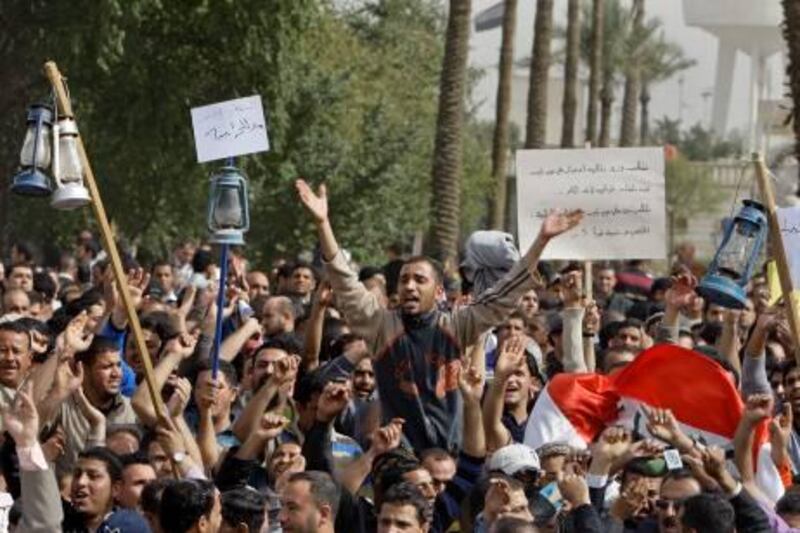BAGHDAD // Thousands of protesters prepared to take to the streets today to call for government reforms and improved public services as the government warned of violence from militants.
The Iraqi prime minister, Nouri al Maliki, urged citizens not to take part, saying they were organised by insurgents and loyalists of Saddam Hussein.
"I call upon you … not to participate in tomorrow's demonstration," Mr al Maliki said in Baghdad yesterday.
He insisted he was not preventing protesters from taking part in the rally, but gave security concerns and claimed that the protest's organisers were tied to the regime of the former dictator Saddam Hussein and al Qa'eda insurgents.
"You can hold these demonstrations at any time or place you want, except for the place and time of a demonstration which Saddamists, terrorists and al Qa'eda are behind," he was quoted as saying by Agence France-Presse.
Protesters have also said they anticipate violence but not from militants. Instead, they fear they will be attacked by government-controlled security units or militias.
"There have been threats made by the authorities that people should not take part in the demonstrations but that will not stop us going out to demand our rights" said a doctor from the Adhamiya district of the capital. Together with other intellectuals, he has been involved in organising the demonstrations. He spoke on condition of anonymity because he said protest leaders were being targeted by government forces.
Mazen Saed, another of the protest organisers, said seven leading protest figures had already been detained by security units and that the identity cards of dozens of people who wanted to take part in the demonstrations had been confiscated by police, a step that will stop them being able to pass through security checkpoints, in effect preventing them from taking part.
Mr Saed also dismissed claims of al Qa'eda threats, saying the government was scaremongering to stop people taking part.
"They want people afraid so the protest fails," he said.
According to protest leaders, staff from Mr al Maliki's offices had asked to meet them before the march to discuss their demands, an offer they had refused.
"We did not want to speak to them, they just want to cancel the demonstration but we insist it must go ahead, it is the only way to make things change," one of the organisers said.
In recent weeks Iraq has seen a series of isolated, small-scale protests by people angry over high unemployment, poverty, corruption and failures by the government to provide basic services, including clean water and electricity.
Some of these demonstrations have turned bloody. Earlier this month in the southern city of Kut, 2,000 protesters stormed local council buildings and set fire to administration offices. At least three civilians were shot and killed by the police who used live ammunition against the demonstrators.
Although a rally in Baghdad on February 14 passed largely peacefully, demonstrators who camped out in the city's Liberation Square since then say they were forcibly removed and beaten by security units.
"Late on Tuesday night, guards came and knocked down our tents, we had to run for our lives and hide in the alleyways, the forces were very angry and beat us with sticks," said Saad Ibrahim, an unemployed biology graduate taking part in the protest. Undeterred, he insisted he would take part in today's march.
"For seven years we have listened with patience to government promises that they were working to make improvements." he said. "Those promises were empty, the are still no jobs, no security and the government has wasted billions of dollars of our money. The only solution is to change it all, including the prime minister."
As with demonstrations in Egypt, Tunisia and elsewhere in the Middle East, protest organisers have been using social networking websites, including Facebook. Tens of thousands are expected to attend the Baghdad rally. That huge scale, plus the boiling anger of may ordinary Iraqis and the on-going insurgency, have created a dangerous cocktail and a sense that some kind of violence is inevitable, despite protesters saying they want to peacefully call for reforms.
Abdullah al Aziz, a businessman in Baghdad's Shorjah market, said he and other wealthy traders had already moved their families and valuable stock outside of the city.
"Everyone is afraid that gangs will be unleashed on Baghdad," he said. "I would not be surprised if the government sent gangs to loot and destroy things, in order to give the protesters a bad name, as [former Egyptian president Hosni] Mubarak did in Egypt".
A security official working in Baghdad's operational command centre said they had intelligence reports that al Qa'eda planned to set off bombs in crowded streets.
"We believe al Qa'eda will be active and that thieves are also planning to steal from banks while they have the chance," he said. "But we will do our best to protect the city and the demonstrators, even if they do not have a licence [to hold their demonstration]."
The Iraqi government has tried to mollify an angry public, promising to cut politicians' high salaries and to improve public services quickly while creating jobs. However, those measures have done little to prevent a growing wave of discontent.
Ahmed al Bahadili said: "The politicians are afraid of the people who are now demanding their rights. The MPs have tried to make concessions but no one here trusts them any more, no one has any faith left in parliament."
Unconfirmed reports from a security source at Bagdhad's airport also indicated that some 30 MPs and their families took flights out of the country yesterday. The airport source also said that a number of MPs had been prevented from leaving because they were carrying tens of thousands of dollars in cash.





